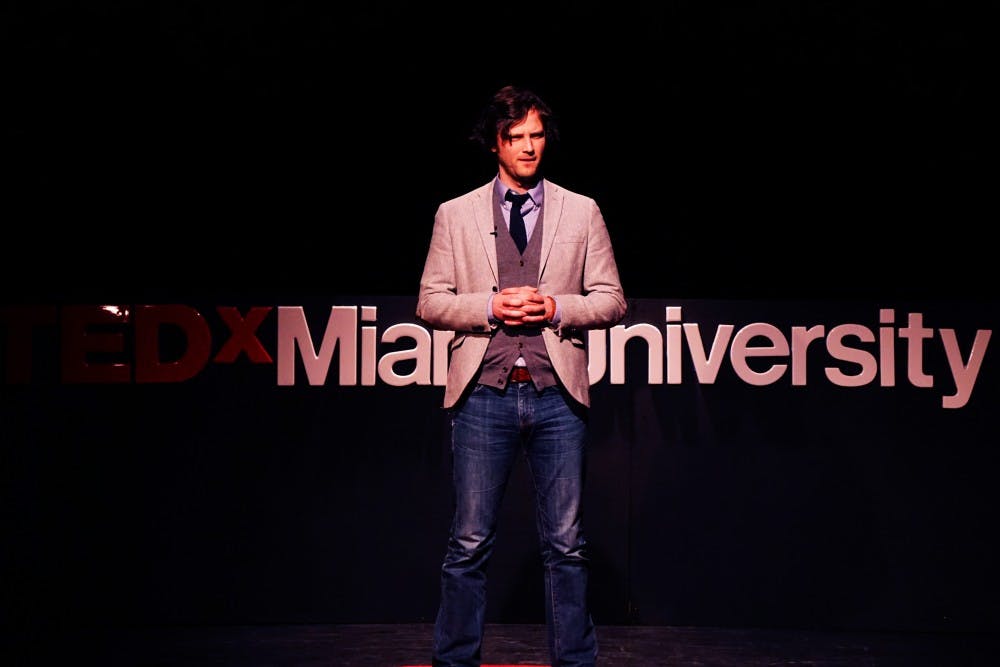Standing in the inverted spotlight of the red TEDx dot, Miami faculty, alumni, undergraduates and graduate students gathered on Sat. March 4 to learn from each others' "ideas worth sharing."
For James Donnelly, president of TEDx Miami University, TEDx has the ability to empower the Miami community.
"Other universities have been doing [TEDx] for a really long time and have been doing a really good job and they get recognition through that," said Donnelly. "Places like Michigan or Harvard -- yeah, we know they're good -- but we have great ideas worth sharing here, too. I think it's really important not only for TEDx Miami University, but also for the university as a whole to be able to showcase the great talent we have here."
That talent included Amanda Horne, a gerontology graduate student, who discussed the role of traumatic experiences in the process of aging.
"If something happened to you yesterday, you're aging with it tomorrow," she said. "Mental health is not a clean slate every day."
Horne discussed the importance of art therapy, particularly for veterans with PTSD, as an alternative that avoids some of the negative connotations of traditional therapy.
"It's not therapy, but it's therapeutic," Horne said. "[Veterans] are receiving resources, therapeutic resources. They have an outlet, they have a means of expression, but most importantly, it's not stigmatized."
Miami alum Blake Smith then took the stage to expose what he calls "the lie" of the fashion industry. In order to sell clothing, particularly within the business model of "fast fashion," companies rely on exploiting the consumer's insecurities. This lie, as he phrased it, tells consumers, "You are not okay. You need to buy things in order to be made whole."
Smith has devoted his professional life to combating that messaging in the marketplace itself, and he shared the truths he believes can help an individual move to a "place of completeness apart from consumption."
"I know who I am. I know what I like," Smith said.
In her presentation, Megan Gerhardt, a professor of Management and Leadership in the Farmer School of Business, also offered a unique perspective on today's consumer marketplace. Gerhardt's professional experiences have helped her conceptualize how to bridge the gap between older professionals and the Millennial generation.
"In 2008, I was invited to do a leadership development workshop at a company," she said. "To them, Millennials were a problem that needed to be solved."
But Gerhardt doesn't see it that way.
"[Millennials] hold two critical keys: new ways to solve problems and the passionate energy to do so," Gerhardt said. "I work with leaders not to help them change the Millennials but to change themselves -- to change their perspective on what might be possible."
She calls this "gentelligence."
"The idea that diversity is powerful is something we all understand, but I don't think we've yet understood this generation as a valuable form of diversity, and I wanted to help connect that for people," Gerhardt said.
Undergraduate Cole Agenbroad's TEDx presentation focused on the ecological importance of connected habitats. Agenbroad cited a research experience in Banff, Canada.
"In Banff, they were able to remove a building if it was deemed to have a negative impact on the environment, while 10 miles south in Canmore, they were focused on developing directly to the edge of the valley," Agenbroad said.
The problem, Agenbroad said, is the way these political boundaries arbitrate a wild space to the detriment of native species.
"The cost of fixing our natural world is great, but it's one that we've placed on ourselves," he said.
Finally, Nathan French, a professor of international studies and comparative religion, explored the ways people can negotiate cultural differences outside of the harmful dichotomy of "us versus them."
"We live in a time of 'they,'" French said. "'They,' we are told, are a threat to our national security. 'They' are a threat to our jobs and our economy."
However, empathy, French said, is a way past this fearful response. Once on a flight, French retold, he struck up a conversation with the mother of an American veteran. Her son was on the ground during the 2003 invasion of Iraq and, since then, fourth of July fireworks have become a trigger for his PTSD. French told her about an experience he had in Cairo when he met a student who had also been in Baghdad during Operation Iraqi Freedom. He, too, reacted violently to a fireworks display.
For French, and his friend from the plane, this was an important connection.
"Hold your breath, find familiarity of experience, and change and be changed," said French. "[The mother on the plane] saw, in an Iraqi she had never met, her own son, based on that familiarity of experience. The value of empathy is the value of finding we."
Deeksha Singh served on the finance committee of the TEDx event, and she enjoyed French's presentation in particular.
"I think [TEDx talks] are really thought-provoking because they make you think about real things," Singh said. "I've also lived in the Middle East so I could really relate to [French's presentation] on a personal level. When you're on the other side, you don't always know what's going on in another place."
Attendees also had the opportunity to write down an "experience worth sharing" and get photographed in front of the TEDx banner.
Singh wrote, "I forgot to eat breakfast today."
"Food is really important to me," she said, laughing.
Other participants' experiences ranged from the jocular ("cooked minute rice in 58 seconds") to monumental, but each were a contribution to TEDx's goal of having a "global conversation about our shared future" -- a global conversation that includes Miami.

